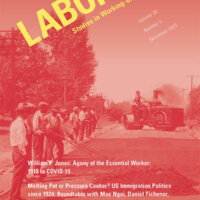Welcome to LAWCHA
Classroom in new school at Okeechobee migratory labor camp. Belle Glade, Florida, 1941. Library of Congress, C-USF34-057129-D.
LAWCHA is an organization of scholars, teachers, students, labor educators, and activists who seek to promote public and scholarly awareness of labor and working-class history through research, writing, and organizing.
There are currently no events.
Become a member of LAWCHA
Receive monthly updates.
769



